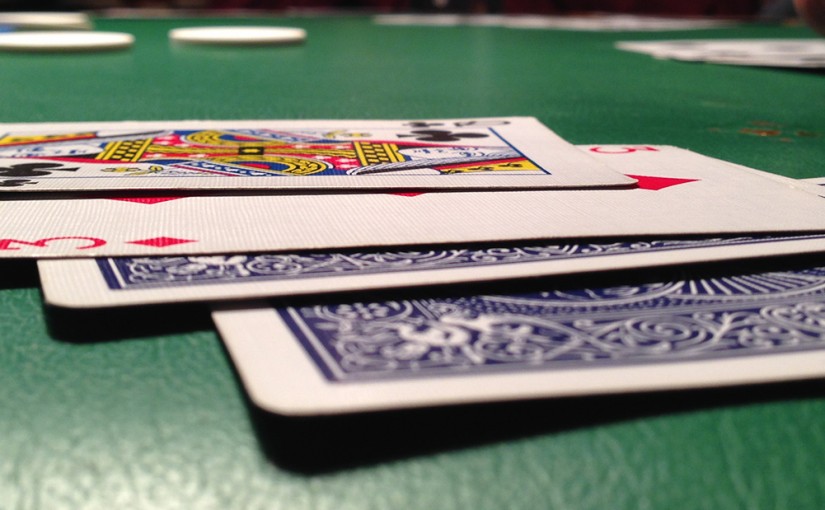Back to work on Novel Two, which means relearning all the acronyms and trying to remember the factions they represented in the Spanish Civil War. So I took time out from multiple flavors of socialism to have some fun imagining a poker game that might have taken place in the Hotel Florida in Madrid sometime in 1937. Madrid was still in Republican hands although the Nationalist bombing campaign had begun. The characters are Robert Capa, Chim (David Szymin), Henri Cartier-Bresson, Ernie Pyle, Ernest Hemingway, and Richard Lenoir, who is a young, entirely fictional French journalist. The game is five-card stud.
Chim: “We don’t have all day, André, Franco’s planes are due any minute.” Chim, who had changed his name from Szymin to Seymour but was known to everyone as Chim, refused to call Capa anything but André, although that wasn’t his birth name either. His parents called him Endre Friedmann.
Pyle: “It would be more accurate to call them Hitler’s planes. The Condor Legion is leading the raids.”
Cartier-Bresson: “That’s not exactly comforting.”
Hemingway: “Your king bets, Capa. What do you say?”
Capa: “I need a minute, where’s Gerda?”
Lenoir, who is not playing, answers: “I think she went upstairs to edit photos.”
Capa: “Lenoir, can you ask her…No, wait. Can you loan me 100 francs?”
Lenoir: “Sorry, Bob. I don’t have it.”
At that moment the concussion from the bombing was close enough to rattle the windows.
Cartier-Bresson: “That does it. I’m going to the shelter.”
Hemingway: “You can’t leave, Henri, Capa has to bet.”
Cartier-Bresson: “I fold. Now I can leave.”
Pyle: “You can’t fold. It’s Capa’s turn.”
Capa: “Henri, if you’re out, you can loan me 100 francs.”
HC-B: “To be returned when?”
Capa: “When I win, of course.”
HC-B, walking away: “That’s what I’m afraid of.”
Chim: “I’m beginning to think the war will end before this hand, and neither ending will be pretty.”
Capa: “I raise a hundred.Henri will cover it, but it won’t be necessary. ”
Pyle: “I don’t think I want to know. I fold.”
Chim: “Me too. It’s up to you, Papa.”
Hemingway: “I’ve got to call your ass, Capa. How many of those aces do you have?”
Capa: “Two. That ought to be enough.”
Hemingway, revealing three nines, “Not quite.”
Capa: “Let’s have a drink. Lenoir, can you buy us a drink. What’s that you’re reading, a letter from your lover? Is that a smile. I’ve never seen him smile before. Is he happy?”
“Hard to tell,” Chim said. “That might be a smile on his face, I’m not sure.”
“I don’t think it’s a smile, maybe it’s a rueful smile. What would you call it, Papa?”
“Photographers, totally useless without a camera. You don’t know how to interpret or even describe, you can only record what your machines allow. It takes a writer to truly understand another man. The young man is trying to be happy but that is only part of the picture. When you study him, you see sadness behind the smile, which is not rueful at all. He does not regret; he hasn’t yet done anything wrong, in fact he hasn’t done anything at all. His sadness is not full of remorse, it is empty, unfulfilled. It is the sadness of a man who thinks he knows what he wants but cannot have it. Yet the possibility remains, it might still happen, but he cannot make it happen. He must wait for events to run their course, so he is frustrated, but his love has given him reason to hope. He is still in the running, if not yet in the lead. Gentlemen, our young Lenoir is in love, although he has not yet been able to make love to the woman he desires. He is trying to compensate by devouring, again, and again, the words that give him hope. But it is not enough. Il est triste, oui, but he is also very horny.”
That brought a great roar of laughter and cheers from the assembly of journalists.
“Bravo, Papa.” they shouted, and produced a round of drinks.
Lenoir looked up from his letter. He was not smiling: “Fuck you, all of you. Especially you, Hemingway.”
Papa roared: “Bravo Lenoir, not exactly eloquent, but the only appropriate response.”
©2015 Ron Scherl

